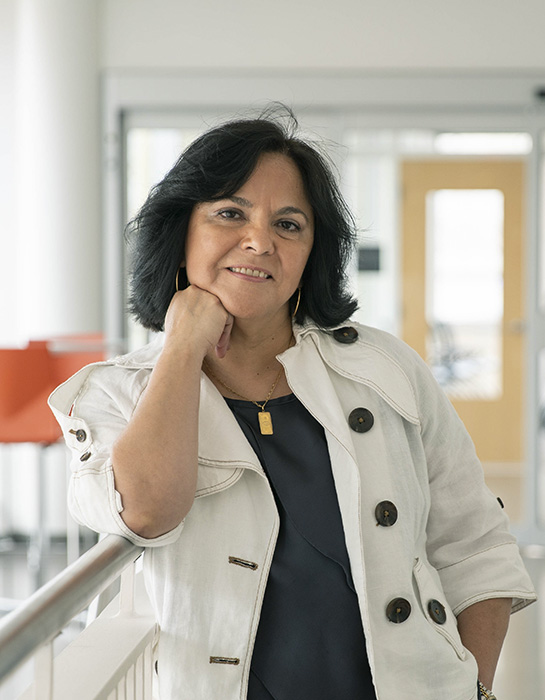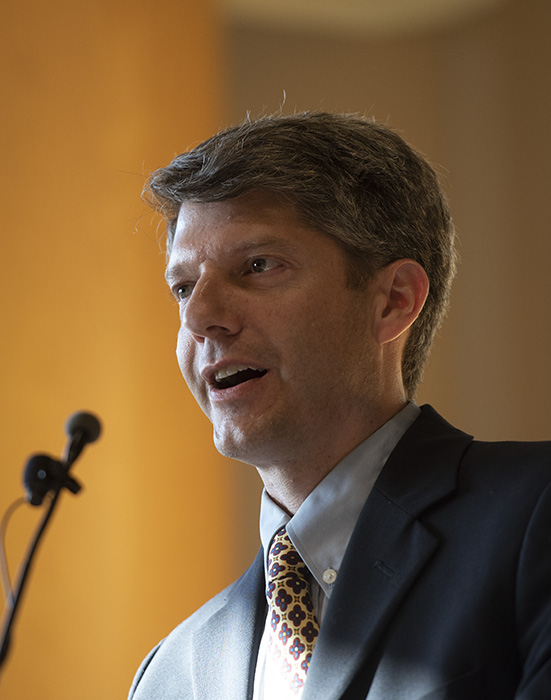Anticipate the Turn
After more than a year of COVID-19, CMU experts reflect on a changed world
Thrust into the middle of the coronavirus pandemic, the thinkers and doers at Carnegie Mellon University push on. Researchers tackle new problems as lecturers innovate unexpected ways to connect with the bright minds of tomorrow.
The late Randy Pausch, a CMU alumnus and professor, spoke about dealing with the unexpected: "We cannot change the cards we get dealt. Just how we play the hand."
Pausch said this while delivering "The Last Lecture" in 2007 after being diagnosed with pancreatic cancer. His moving message of how to live a fulfilling life of purpose aligns with the core values the Tartan community practices to this day.
COVID-19 is the hand on the table, and the best players have a plan for when the next card is turned. The coronavirus shook the world, accelerating changes in education and technology, disrupting models in business and entertainment and fundamentally redefining how work gets done.
Looking forward, CMU experts share their thoughts on the best applications for advancements made in the past year, preparations for a post-pandemic landscape and how lessons learned can inform the future.
Below are reflections from two Dietrich College of Humanities and Social Sciences faculty members who contributed to this series.
— Dynamic Decision Making —
I study the way people make decisions and adapt their choices in changing environments (an area called dynamic decision making or DDM). COVID-19 has made the study of DDM more real, palpable and relevant than ever. In dynamic environments, decisions are made from experience, through exploration and learning from feedback, and by applying past decisions to similar, novel situations.
My research has taught me that there are at least three essential elements that help people adapt to dynamic and evolving environments successfully:
- To acquire a high diversity of experiences;
- To act under uncertainty by applying all similar past experiences to the current context;
- And to account for the feedback the environment can provide and learn to update past experiences accordingly.
A high diversity of experiences is created when we work in larger interdisciplinary teams. Thus, I see an increasing need for creating interdisciplinary research projects with people that can work together in solving global societal problems. Also, the need for computational approaches to study human DDM is increasing exponentially. We need computational representations of the human decision processes that help in connecting with many other communities, demonstrate the usefulness of such models to predict decisions under uncertainty, and generate ideas on how we can help humans learn from the feedback in dynamic environments. COVID-19 is an example of how global societal problems cannot be solved by individuals working in their own fields; a large-scale of interdisciplinary collaborations in which research on human decision making and the computational representations of such processes is needed.
To look at the similarity across DDM contexts is important to solve novel societal issues. For example, from the DDM perspective, the issues raised by the pandemic are very similar to those involved in other dynamic problems in our society, such as climate change. How humans make decisions with carbon emissions can seem very distant, but climate change and COVID-19 are both dynamic situations evolving over time with feedback delays. That means one cannot immediately observe the results of our decisions, which makes learning very challenging.
In the case of global warming, it is hard to see the effects on carbon reduction of taking a bike instead of driving a car, or flying to fewer conferences, given the significant feedback delays. But those decisions have real aggregate global impacts. In the case of COVID-19, feedback delays might be shorter, and the impact of wearing a mask in public may show a more immediate effect on the spread of coronavirus.
It is clear from the COVID-19 situation that in the future, humans will require more of these DDM abilities.
— The Fault Lines of Society —
People can be reluctant to work on the foundations of homes because that work can be expensive and, unlike investing in a kitchen or a bathroom, the work is often invisible. But if you neglect the foundation, the rest of the structure can lose its integrity.
Public health is part of the foundation, and the home is our republic. Nobody expected that this particular virus would cause this particular pandemic. But many of us who work in this area have known that the U.S. has neglected public health foundations for far too long, and problems that are occurring are the avoidable consequences of that neglect. For me, the pandemic has been the realization of longstanding fears.
Epidemics reveal the fault lines in society, and COVID-19 is no exception. My hope is that we will pay careful attention to these fault lines and undertake the difficult work needed to shore up the foundations of our republic. I will mention three issues.
One is social trust. In a crisis, rumor flourishes and social divisions widen. Collective action in the U.S. is particularly difficult to muster because politics are so polarized. Important issues quickly become tainted by partisan positions that dumb down complexity and prevent cooperation. We saw this early on when hydroxychloroquine was touted as a safe and effective treatment for COVID-19 on the basis of thin and heavily biased information. We must do more to create a space in public culture where we can express uncertainty about important issues, identify and agree on evidence, and then make decisions on the basis of that evidence and shared values.
A related issue is combating misinformation. The speed with which safe and effective vaccines have been developed is amazing. But vaccines won't safeguard individual and public health if they aren't used. Rates of vaccine hesitancy are increasing because of fears about safety and efficacy that are often grounded in misinformation and conspiracy. Social media is like a broken downspout spilling water into the foundations of our house, with misinformation and conspiracy causing the erosion.
Finally, but perhaps most importantly, the pandemic has underscored how far we have to go in the struggle for civil rights and racial justice. Black and Hispanic patients are more likely to contract COVID-19, be hospitalized and die as a result. These differences reflect the legacy of exclusion that creates patterns of poverty and poor health, which are exploited by a novel contagion.

